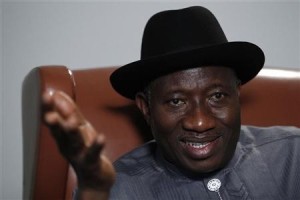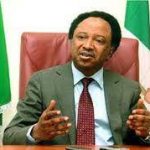National CONFAB Okays Rotation Presidency Among Six Geographic Zones
Featured, Latest Headlines, News Thursday, July 3rd, 2014
The National Conference on Thursday resolved that the office of the President of Nigeria shall rotate between the North and South and revolve among the geo-political zones.
It was also agreed that the office of the state governors shall be rotated among the three senatorial districts of each state while that of the local government chairmen shall to be rotated within the local government areas.
Also, local government councils not democratically elected shall not be recognized by all authorities and persons and would not be entitled to any revenue allocation from the Federation Account or the Account of the State Government or exercise any function exercisable by local government councils.
These were parts of the resolutions adopted by the Conference while considering the Report of the Committee on Political Restructuring and Forms of Government; which attracted intensive debates and lots of amendments.
The Committee was mandated to primarily examine the extant structure and forms of governments in the context of the peculiar circumstances of Nigeria’s diverse and multi -ethnic setting.
It was also expected to examine Nigeria’s attendant challenges and the need to lay a solid foundation for an all-inclusive and cost-effective system of government which would serve the best interest of Nigeria and Nigerians.
Where the President dies in office, is incapacitated, impeached or where he resigns, Conference agreed that the Vice President shall operate in acting capacity for a period of 90 days during which an election to the same office would be conducted.
This decision was taken because each zone is expected to run the full course of the constitutionally allowed tenure without undue disruption; and it was also agreed that based on the adopted zoning formula, when a president leaves under any of the circumstances stated above, another president would be elected from the same zone where the previous one came from.
Conference also voted in favour of Modified Presidential of Government as recommended by the Committee; described as home-made model of government that combines the attributes of Parliamentary and Presidential systems.
The concept is believed to have the potentials of entrenching the principle of Separation of Powers as practiced in presidential system and promotion of co-operation and harmony between executive and the legislature as operated under the parliamentary system.
The President elected under the new system shall exercise full responsibility for his government and shall select ministers, not more than 18 of them, from the six geo-political zones of the country.
It was agreed that henceforth, the Minister of Finance and no longer the President as presently obtained, would present the annual budget to the National Assembly.
Under the new arrangement, both the President and the ministers would be expected to appear before the National Assembly to render account of their stewardship on quarterly basis.
Conference also voted to retain the bicameral legislative system instead of the unicameral proposed by the Committee in its report.
Still on local government administration, delegates approved the scrapping of Joint State and Local Government Accounts; to be replaced with a State Revenue Mobilization, Allocation and Fiscal Commission.
The body would be expected to have as members, representatives of local government areas and a chairman nominated by the state governor for confirmation by the state House of Assembly.
In addition to the functions conferred on the local government councils as specified in the Fourth Schedule of the 1999 Constitution as amended, a State House of Assembly may by law, confer other functions on the local government.
Henceforth, and except otherwise overturned, Conference adopted a recommendation to confer financial autonomy on State Houses of Assembly as a way of freeing them from direct control by the executive.
Conference agreed that the Constitution shall fix the tenures for local government councils.
It was also voted that for functionality, local government should be politically and economically independent.
Delegates voted overwhelmingly on the proposal that each state of the federation should have its own constitution which of course would be subservient to the Federal Constitution.
While agreeing that the Constitution should be amended to allow for less onerous process for state creation, Conference specifically approved the creation of an additional state for the South East zone, “in the spirit of reconciliation, equity and justice.”
Henceforth, it said state creation should be on the basis of parity between the geo-political zones to ensure equality of zones.
Related Posts
Short URL: https://www.africanexaminer.com/?p=13852























